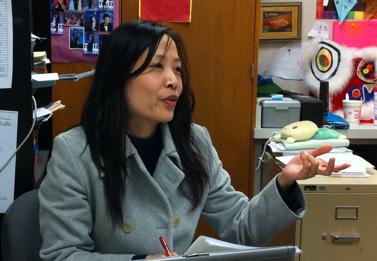 Recently published excerpt sparks campus-wide debate over parenting
Recently published excerpt sparks campus-wide debate over parenting

Hours of forced piano practice. Hundreds of tears shed over a B on a report card. Thousands of miles to and from numerous extra-curricular activities.
How familiar it sounded to many MVHS students.
On Jan. 8, the Wall Street Journal published an excerpt of The Battle Hymns of the Tiger Mother, a memoir by Yale law professor Amy Chua that details the cultural differences in parenting styles between Westerners and Asians. The excerpt, headlined “Why Chinese Mothers Are Superior,” quickly spread over the Internet as both supportive and hostile readers flooded the website with over 6,000 comments, including those from prominent Ivy League professors.
With 71 percent of its students being of Asian descent, MVHS had many students and teachers voice strong opinions on the issues presented in the publication.
“When I first read the article, the first thing that came to mind was that all the underlying things in the article were very true,” junior Jenny So said. “But I don’t think the way that [Chua] portrayed [the issues] was correct.”
The article, which some allege is misleading, brought forth nation-wide attention to the different methods of raising children. In the excerpt, Chua attempts to define the benefits of raising a child the “Chinese” way, and the weaknesses of the “Western” way. Full of personal anecdotes and criticisms of Western customs, Chua’s piece on the Chinese upbringing ultimately found an audience at MVHS with both Asians and non-Asians.
“I was [initially] very disappointed and frustrated with the message that [the article sent],” math teacher Colin Anderson said. “Then I looked at some more information, and it seemed that it was taken out of context and poorly edited.”
Despite the debate over the excerpt’s accuracy, the dispute over the comments on the upbringing of a child continues to rage, as some argue the issues are directly applicable to MVHS. Some of these include the relationship between a parent and a child, the lengths to which a parent should control a child’s life, and whether it is acceptable for a parent to override a child’s desires.
To communicate these issues, many students, parents, and faculty members posted statuses on Facebook and Twitter on the subject. Several literature classes held class conversations on the issues raised in the article. Among teachers, copies of the article were shared and discussed.
Some people, like Chinese teacher I-Chu Chang, could relate to the issue of parental pressure.
“When I was a kid, [my mother] would enroll me in a bunch of extra-curricular activities,” Chang said. “I remember every day I would have somewhere I had to go.”
For students like So, one part of the excerpt stands out as an accurate portrayal of the parent-child relationship.
“I think that the most similar part between the article and my life is [the statement] ‘You owe your parents for the rest of your life’,” So said. “I completely agree with that.”
Chua’s words have struck a nerve with numerous educators, students, and parents throughout the country. Though the debate may never be resolved, some believe that sensitive issues about raising children, coupled with its effect on education methods, still need to be addressed.
“I do not think that there is a Western or Chinese way [to bring up a child],” Anderson said, “but I think finding the right balance is where most people find success.”
Check out El Estoque On Point’s coverage of the issue.








